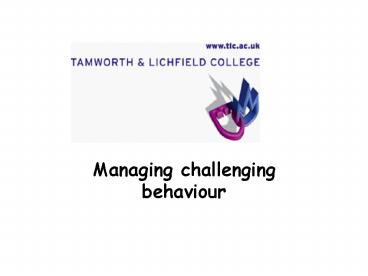Managing challenging behaviour - PowerPoint PPT Presentation
1 / 11
Title:
Managing challenging behaviour
Description:
Vizard, D. (2001) Behaviour Solutions In the Classroom: dave_at_behaviourmatters.com ... Challenging behaviour is often triggered: Be aware of danger signs and pre-empt ... – PowerPoint PPT presentation
Number of Views:1918
Avg rating:3.0/5.0
Title: Managing challenging behaviour
1
- Managing challenging behaviour
2
References
Galvin, P. (1999) Behaviour Discipline in
Schools 2 David Fulton Publishing Goleman, D.
(1995) Emotional Intelligence Bloomsbury Lambert,
D. (1996) Body Language Collins Gem Harper
Collins Rogers, B. (2000) Classroom Behaviour
Books Education Thody, A. Et al ( 2000) The
Teachers Survival Guide Continuum Vizard, D.
(2001) Behaviour Solutions In the Classroom
dave_at_behaviourmatters.com www.dfes.gov.uk
3
Good behaviour and discipline in schools are
essential to successful teaching and
learning DFE (1994)
4
teachers group management skills are probably
the single most important factor in achieving
good standards of classroom behaviourthose
skills can be taught and learned. Elton report
(1989p69)
5
Causes for breakdown initiated by the tutor
- Lack of confidence
- Lack of subject expertise
- Lack of continuity in sessions
- Poor communication skills
- Lack of enthusiasm
- Poor planning
- Difficulty in handling challenging behaviour
6
Causes for breakdown initiated by student
- Boredom
- Mismatch between students ability and tutor
expectations - Attention seeking
- Too much effort with no appropriate break
- Self-esteem (Egotistical/Bully)
- Attitude
- Personality/Interpersonal styles (aggressive)
- Talkative
7
Establishment of Ground rules
- Get them in (greet, seat, start)
- Get them out (conclude, dismiss)
- Get on with it (content, manner)
- Get on with them (whos who, whats going on
- Smith Laslett (1993) Effective Classroom
Management A Teachers Guide, Routledge
8
Rule making
- Simple, clear, few
- Be collaborative
- Positive in tone reinforces good behaviour
- Be understood by all
- System applied consistently
- Reasons for rules clearly explained and justified
- Be aware of any possibilities of rules being
circumvented - Dont move the goalposts
- D. Vizard (2002)
9
Positive Classroom Management D. Vizard
- Always expect the best from your students this
shows you have faith in them that they can behave
well - Make your expectations clear Shows that you are
purposeful and you know what will help them - Reward and praise often Enhance strengthen
self confidence - Involve them in rule setting Promote ownership
and collective responsibility - Challenging behaviour is often triggered Be
aware of danger signs and pre-empt
10
- Behaviour is functional Look to the
consequences of behaviour, what does it achieve? - Behaviour happens in context Why is the student
behaving in this way, in this context? - Get to know their personal qualities, interests
and strengths This will show them that you value
them as individuals - Avoid personalising issues-be hard on issues
caring of students Enables students to be more
responsible for their own behaviour - Make lessons varied, engaging, social,
challenging Prevent disruption via boredom
11
- Explain the big picture at the beginning and
chunk sessions This will link new knowledge to
existing knowledge and motivate them towards new
goals - Behavioural difficulties are an issue between you
and the student, not just them This conveys your
commitment to them as learners - The best way to change their behaviour is to
change what you do Classroom management is a
skill with techniques that can be learned - Classroom behaviour is always a management issue
Promoting ways to reduce behavioural problems
before they happen is the best approach































